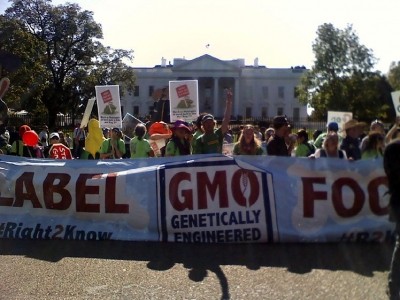'Nowadays, a food crisis starts when the Food Babe is on line two'
'Pseudoscience-busting' blogger behind SciBabe talks food science for meme lovers

If the anti-GMO lobby has taught us anything in the past few years, it’s that the way information is packaged is important, Yvette D’Entremont, a chemist and the “pseudoscience-busting” blogger behind SciBabe, told FoodNavigator-USA.
“It wasn’t that people didn’t want the accurate information that the science community was giving out about GMOs,” D’Entremont said. “It’s that anti-GMO information came in an attractive little package, and it was palatable. ‘Want us to tell you about safer food?’ That’s how they’ve presented themselves—punchy and to the point.”
The ivory tower of science
Mark Hughes, president of food ingredient marketing firm Anderson Partners, said that GMOs in particular illustrate the difficulties of effectively communicating food science to the public.
“In the scientific community they talk about GMOs as helping fulfill the need to produce more food to feed a hungry planet,” Hughes said. “What’s missing is, ‘OK, what’s the benefit to me, the consumer, when I’m at the shelf in the grocery store?’ All they see is one label that says ‘no GMOs’ and one that doesn’t.”

That’s due in part to poor branding, he noted. Being described as 'genetically modified' doesn’t sit well with consumers who are increasingly seeking out natural, closer-to-earth food and beverage products. Moreover, the ongoing battle over federally versus state-mandated labeling has shifted the argument to one of labeling rather than one of the science of GMOs, he said.
But it’s also due to what Hughes dubs a big mistake in the industry: using science from an ivory tower.
“By that we mean sometimes the industry is too heavy handed with science, almost to the point of saying, ‘I’m a scientist, you wouldn’t understand,’ instead of making science approachable and easy to digest,” he said.
Time to climb down from the ivory tower?
In what D’Entremont calls “the ADHD era,” consumers increasingly want their information—whether that’s news headlines or entertainment—in punchy, funny little doses. Much as comedians Penn and Teller have tackled pseudoscience and paranormal beliefs with subversive humor on their Showtime docu-series “Bullshit,” and animated Comedy Central series “South Park” has addressed everything from racist rhetoric to politics “using a bunch of fourth graders,” D’Entremont said the science community could benefit from a little more accessibility and humor.
“It’d be great if we could figure out memes saying here’s a bit of information that debunks a food myth, is funny, will get traction and engage people,” she said. (See how “The Daily Show” did it here).
D’Entremont’s own rise to fame came not from a meme but rather a lengthy “Gawker” article discrediting activist blogger The Food Babe through science. (The piece has amassed some 4.6 million unique views since April). But she noted that humor was a key piece to keeping readers’ attention.
“The ‘Gawker’ piece is long and there’s a lot of science in there, but there’s also a joke in almost every paragraph,” she said. “I never waited too long until the next punch line.”
Always on the back foot?
But whether it’s GMOs, azodicarbonamide (“azo”), lean finely textured beef (“pink slime”) or MSG, it seems that the food evangelists often get to tell their stories first—raising public concerns over their purported impact on the health and safety of them and their children. Such skepticism has put the industry in a seemingly constant state of reacting.

“Communication relating to food science, especially when it comes to the big food manufacturers, has been totally reactionary,” Hughes said. “We have a running joke that it used to be a food crisis was when a factory or plant called and said a ton of ground beef has tested positive for E. Coli. Nowadays, a food crisis starts when the Food Babe is on line two.”
Evangelists have real, powerful concerns about feeding this food to their kids
Having a strategy for responding to and engaging with the Food Babes on line two is critical to building and retaining trust with consumers, Hughes said.
“We’ve seen a lot of research pointing to the influence of evangelists and opinion-driven advocates. Consumers trust and listen to them,” he said. “So if you appear defensive or non-transparent, whatever you say will be heard with suspicion.”
And it starts with listening to the evangelists’ concerns.
“These people have real concerns about feeding this food to their kids. That’s a powerful dynamic. You have to understand why they’re concerned, so you can engage and speak back, not from a defensive position, but from an empathetic position. Then the science can help you address it.”
A big part of that strategy is being swift in the response and using same media and channels being used by the activists.
“Speak back in the environment they’re speaking to,” he said. “The same consumers who trust and listen to them are doing so on the same social media platforms. So that’s were you have to go to reach audience that evangelists have.”
Speaking back means relaxing company social media policies
D’Entremont said that if the industry could also see this increasing quest for information not as a nuisance but rather an opportunity to showcase the human element of the food industry, consumers might be more apt to listen.
“People forget there’s a human being behind the food. They think it’s just a big corporate head,” she said. “But the scientists and chemists tasting it are making sure product is going to be not just palatable but safe. And they eat it and feed it to their children, too.”
And while social media is key to telling those stories and engaging the increasingly curious consumer, it will undoubtedly require companies to loosen up a little.
“Especially the big companies should be willing to get rid of social media policies that handcuff their employees. Go ahead and tell people to talk about their business practices. That’d be hugely helpful in showing that there are human beings behind it.”










